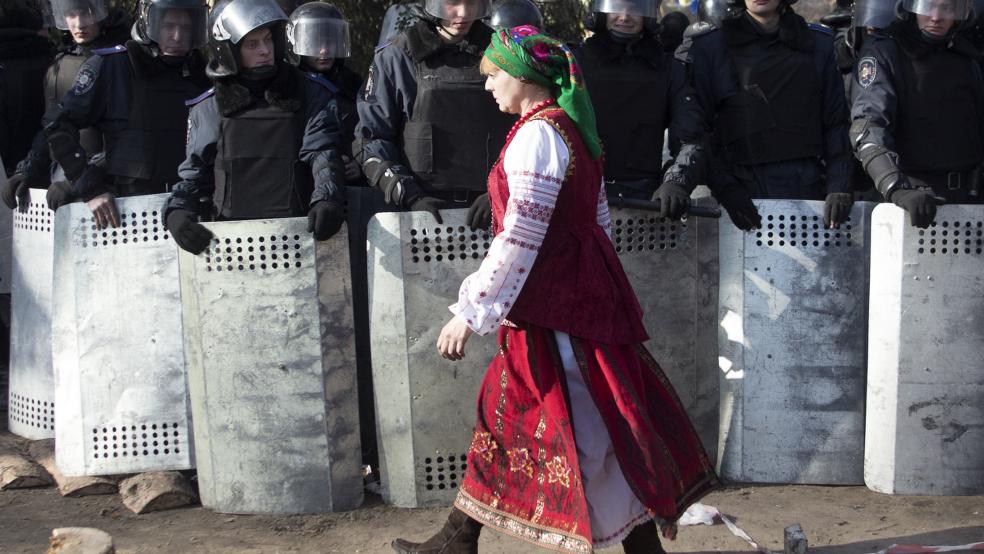Violent protests continued in Kiev’s Independence Square today despite a truce agreed to between the pro-Russia government of Viktor Yanukovych and the pro-Europe protestors that have been occupying the square since November. More than 100 people have now been killed.
In response, late Thursday the European Union agreed to put in place sanctions against Ukraine, including travel bans and the freezing of assets of officials connected to the crackdown. The United States also put travel restrictions in place for 20 officials who are believed to have ordered the violence.
“The scale of the implementation of that will depend on developments to come and of course we want to see success in government and opposition working together in order to bring about a peaceful situation and a peaceful and democratic settlement,” Britain’s foreign secretary, William Hague, said in Brussels Thursday.
The new sanctions are sure to up the level of tension between America and Europe and Russia, who has been Yanukovych’s chief backer. Russian President Vladimir Putin blamed the west for the escalation of violence and said he supported Yanukovych’s crackdown. Russian Foreign Minister Sergey V. Lavrov was also quick to condemn European action.
“How can you expect that your services will be in demand when the parallel threat of sanctions makes everything very similar to blackmail?” Interfax news agency quoted Lavrov as saying.
Russia’s support of Yanukovych underscores just how important Ukraine is to the Russia. Two reasons have been widely cited for the importance of this relationship. First, many of Russia’s natural gas pipelines and supply routes run through Ukraine to Europe. Since Europe is Russia’s biggest trading partner the pipes need to stay open and the trade routes clear.
“The reality today is that Russia supplies 31 percent of EU gas imports, 27 percent of crude oil imports, 24 percent of EU coal imports, 30 percent of total EU uranium imports, and is the EU’s third-largest supplier of electricity,” said Edward Goldberg, a professor at Baruch College and the New York University Center for Global Affairs. “In turn, the EU is not only easily Russia’s largest trading partner, but it is the market for 88 percent of Russia’s oil exports, 70 percent of its gas exports, and 50 percent of its coal exports.
Second, Russia is believed to want to limit the sway of the west in the former Soviet bloc, an area Moscow believes to be in its sphere of influence. However, Goldberg cautioned that the ties between Moscow and Kiev go much deeper than just energy and the Cold War, making the stakes for Russia much higher than for the west.
“Much more of the soul of Russia is involved in this, much note than just Putin wanting to establish Russia’s old imperial borders,” he said.
Shared history
Ties between Russia and Ukraine date back centuries. Kiev is the center of Orthodox Christianity, Russia’s national religion and considered by historians as the birthplace of the Slavic nation. Russia believes itself to be the historic heir to that nation.
Modern day Ukraine and Russia were also part of the Kievan Rus’, a loose federation of East Slavic tribes in Europe from the late 9th to the mid-13th century. By the 11th Century, Kievan Rus’ was the main cultural center in Eastern Europe.
“For all the salient differences between [Russia and Ukraine], they have much in common when it comes to their culture and history, which goes back to Kievan Rus', the medieval East Slavic state based in the capital of present-day Ukraine,” Serhii Plokhy wrote in The Origins of the Slavic Nations: Premodern Identities in Russia, Ukraine, and Belarus.
According to the 1996 Congressional Research Report, “Russia: A Country Study,” in the 12th Century members of this federation transformed Moscow from “insignificant trading outpost” to the capital of the federation.
Moscow sent “people and wealth to the northeastern periphery of Kievan Rus'; established trade links to the Baltic Sea, the White Sea, and the Caspian Sea and to Siberia; and created a highly centralized and autocratic political system.”
“Kiev was one of the homes of Muscovites culture,” Goldberg said. “I don’t think it comes down to money. It comes down to Russian culture and their historical sphere of influence. But the world has just moved beyond that.”
During the days of the Russian empire in the 19th century, tsars referred to eastern parts of Ukraine that they controlled and as “Little Russia” (Putin has also called Ukraine “Little Russia.) Ukraine also gives Russia a link to Europe as Ukraine’s borders cut deep into the heart of the European continent. Even today, many eastern parts of Ukraine still speak Russian as their main language.
According to Goldberg, this shared history trumps any economic pressure the Americans and Europeans could put on Yanukovych.
“The EU is basically playing with paper swords. They’ve never gotten their act together,” he said. “Ukraine desperately needs funds. Russia is ready to write the check. The EU can’t get together to give their members funds.”
Top Reads from the Fiscal Times





